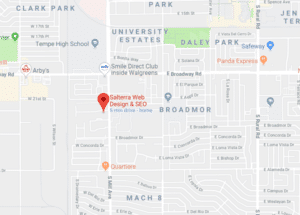
Advanced Schema Markup: The Secret for Higher SEO Rankings
In today’s ever-evolving digital landscape, it’s not just about having an online presence. It’s about standing out, making your mark, and climbing to the top of search engine results pages (SERPs). The secret weapon to making that happen? Advanced Schema Markup.
Transform Your SEO Game with Advanced Schema Markup
Schema Markup, or structured data, improves your website’s SEO performance. It helps search engines understand your content better, enhancing SERP visibility and rich snippets that catch user attention. But it’s not just about the basics – advanced schema markup takes things to the next level.
Advanced schema markups, such as Product, Review, Local Business, and FAQ schema, provide a more detailed understanding of your content to search engines. The result? You gain an edge over competitors with similar content but lack the added layer of knowledge that schema provides.
Unlock Higher Conversions with Advanced Schema Markup
But it’s not just about SERP visibility. Implementing advanced schema markup can significantly boost your conversions too. When search engines better understand your content, it’s presented more effectively to users. Rich snippets featuring ratings, prices, or availability help users get a snapshot of what they can expect from your site. This high-quality information at a glance encourages users to click through, increasing your traffic and conversions.
Making Advanced Schema Markup Work for You
Implementing advanced schema markup might seem daunting, but its benefits to your SEO rankings and conversions are undeniable. And you don’t have to navigate these waters alone. With a deep understanding of how schema works and the nuances of various schema types, our team at Salterra can guide you. We will help you leverage advanced schema markup, tailoring a strategy unique to your business and its specific goals.
With the correct implementation of advanced schema markup, you’re enhancing your SEO rankings and setting your business up for sustained online success. Start your journey to the top of SERPs today with advanced schema markup.”
Advanced Schema Markup by Salterra Digital Services
A website schema, often called Schema Markup or Structured Data, is a standardized way of organizing and presenting information on a website so that search engines can better understand its content. It is a semantic vocabulary based on the Schema.org project, a collaboration between major search engines like Google, Bing, Yahoo, and Yandex.
By incorporating website schema into your site’s HTML, you provide search engines with additional context about the type of content on your pages. This can help search engines display more informative and relevant search results, often in rich snippets or knowledge graph entries.
Several formats for implementing schema markup include JSON-LD (JavaScript Object Notation for Linked Data), Microdata, and RDFa (Resource Description Framework in Attributes). JSON-LD is the most popular and recommended format due to its simplicity and ease of use.
A website schema may cover a wide range of entities, such as:
- Organizations: Businesses, NGOs, schools, etc.
- People: Personal profiles or public figures.
- Events: Conferences, concerts, festivals, etc.
- Products: Physical or digital goods with information about price, availability, etc.
- Reviews: Ratings and feedback about products or services.
- Articles: Blog posts, news articles, scholarly papers, etc.
- Recipes: Ingredients, cooking instructions, and nutrition information.
- Videos: Metadata about video content like duration, thumbnail, and transcript.
To implement schema markup on your website, follow these steps:
- Identify the type of content you want to mark up.
- Choose the appropriate schema vocabulary from Schema.org.
- Use a structured data format (JSON-LD, Microdata, or RDFa) to add the markup to your website’s HTML code.
- Test your markup using a structured data tool like Google’s Rich Results Test or the Schema Markup Validator.
- Monitor your search engine rankings and rich snippet performance to measure the impact of the schema markup.
By leveraging website schema, you can improve your site’s search engine visibility, provide users with more informative search results, and potentially increase click-through rates and user engagement.
FAQ about Schema Markup
What is Schema Markup?
Schema Markup is a standardized vocabulary that helps search engines better understand a website’s content. It provides additional context about the information on your web pages, allowing search engines to display more informative and relevant search results, often in rich snippets or knowledge graph entries. Schema Markup is based on Schema.org, a collaborative project between significant search engines like Google, Bing, Yahoo, and Yandex.
Why is Schema Markup important for SEO?
Schema Markup is essential for Search Engine Optimization because it helps search engines understand the context of your content, leading to better indexing and more accurate search results. By providing search engines with structured data, you can improve your site’s visibility, increase click-through rates, and potentially enhance user engagement. Implementing Schema Markup can also lead to the display of rich snippets or knowledge graph entries, which can make your site stand out in search results and attract more users.
What are the different formats for implementing Schema Markup?
There are three primary formats for implementing Schema Markup on your website:
- JSON-LD (JavaScript Object Notation for Linked Data): The most popular and recommended format, JSON-LD is a lightweight, easily readable format for structuring data.
- Microdata: An HTML5 extension that allows you to embed structured data directly within your HTML content using custom attributes.
- RDFa (Resource Description Framework in Attributes): A format that combines the features of RDF and HTML, allowing you to add metadata to web pages using HTML attributes.
How do I implement Schema Markup on my website?
To implement Schema Markup on your website, follow these steps:
- Identify the type of content you want to mark up.
- Choose the appropriate schema vocabulary from Schema.org.
- Use a structured data format (JSON-LD, Microdata, or RDFa) to add the markup to your website’s HTML code.
- Test your markup using a structured data tool like Google’s Rich Results Test or the Schema Markup Validator.
- Monitor your search engine rankings and rich snippet performance to measure the impact of the schema markup.
Can Schema Markup guarantee better search rankings or rich snippets?
While Schema Markup provides search engines with additional context about your content, it does not guarantee improved search rankings or the display of rich snippets. However, by implementing Schema Markup correctly, you increase the likelihood that search engines will display rich snippets or knowledge graph entries for your content, which can lead to higher click-through rates and user engagement. It’s important to note that search engines ultimately decide what to display in search results based on various factors, including the quality and relevance of your content.
What are the advantages of using schema markup?
Using Schema Markup on your website can provide several advantages:
- Improved search engine visibility: By giving search engines additional context about your content, Schema Markup can help improve your site’s visibility and indexing in search engine results pages (SERPs).
- Rich snippets and enhanced search results: Implementing Schema Markup can lead to the display of rich snippets or knowledge graph entries, which can make your site stand out in search results. Rich snippets provide users with additional information about your content, such as ratings, images, or event dates, making your search results more attractive and informative.
- Increased click-through rates (CTRs): As rich snippets make your search results more appealing, users may be more likely to click on your site. This can lead to increased click-through rates, driving more traffic to your website.
- Better user experience: Schema Markup helps users find the information they’re looking for more quickly and efficiently by displaying more informative search results. This can lead to a better overall user experience, increasing user satisfaction and potentially encouraging users to spend more time on your website.
- Competitive edge: If your competitors are not using Schema Markup, implementing it on your website can give you a competitive advantage by making your search results more informative and attractive to users.
- Voice search optimization: As voice search becomes more popular, Schema Markup helps search engines understand and present your content more accurately in voice search results. This can help you stay ahead in the growing voice search market.
- Easier content discovery: Schema Markup enables search engines to categorize your content better, making it easier for users to discover relevant information on your website through search engines.
- Improved local SEO: For businesses with physical locations, implementing local business Schema Markup can help improve your local search rankings, making it easier for users to find your business in local search results.
It’s important to note that while Schema Markup can provide these advantages, it does not guarantee improved search rankings. Maintaining high-quality content and following SEO best practices are essential to ensure your website’s success.
Can Google, Yahoo, and Bing Search Engines Read Schema Markup?
Yes, Google, Yahoo, and Bing can all read Schema Markup. Schema.org, the standardized vocabulary for Schema Markup, was created as a collaborative effort between major search engines, including Google, Bing, Yahoo, and Yandex.
All these search engines recognize and support using Schema Markup to provide structured data and context about the content on your website. By implementing Schema Markup, you can help search engines better understand your content, improving visibility, more informative search results, and potentially higher click-through rates.
However, it’s essential to ensure that you follow the guidelines provided by each search engine and implement Schema Markup correctly to maximize its effectiveness. Also, remember that while Schema Markup can help improve search results, it is not a guarantee for better rankings, as search engines consider various factors when determining search rankings.
Advanced Schema Guides and Tips
The Complete Guide to Advanced Schema Markup for SEO Success
Understanding the Power of Advanced Schema Markup In today's comp [...]
Answering Your Questions About Schema With Terry Samuels
Answering Your Questions About Schema Returning guest Terry Samue [...]
Ask Me Anything by Terry Samuels: Advanced Schema and Siloing
Advanced Schema and Siloing Terry did an AMA about advanced Schem [...]
What Is Website Schema Markup For SEO Part 2
Take Advantage Of Structured Data To Improve Your SEO By Using Sc [...]









